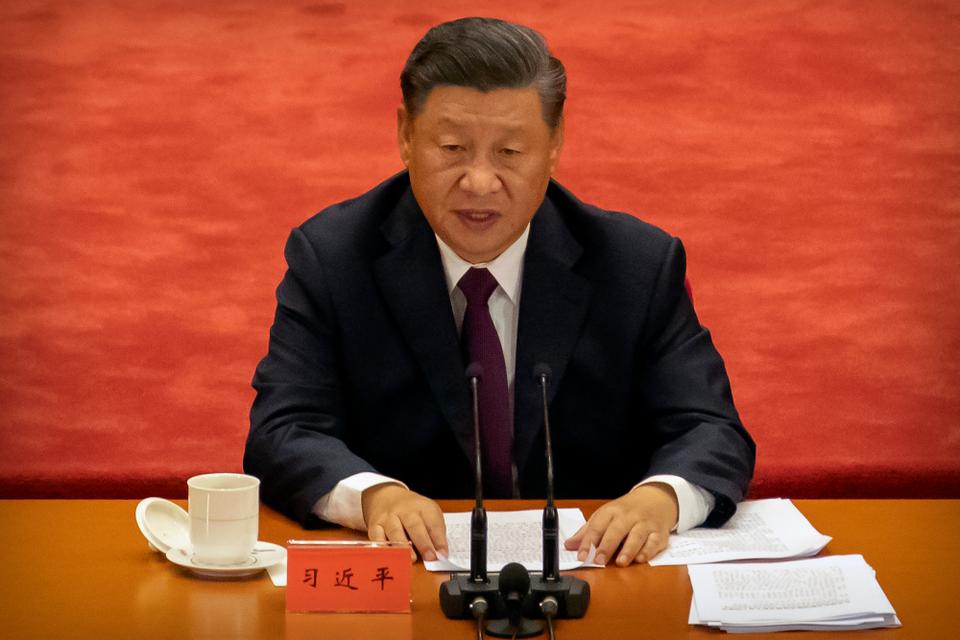US President Joe Biden hosted his first multilateral meeting since taking office, indicating the importance he attaches to the loose group.
Last week’s meeting of the Quad leaders marked the first step US President Joe Biden has taken to check what Washington sees as China’s growing influence in Asia and beyond.
The Quadrilateral Security Dialogue is a loose alliance of Australia, India, Japan and the US that aims to counter a perceived threat from Beijing’s increasing economic and military expansion.
It’s the first meeting that Biden has hosted since he took office as the president in January - something that he emphasised in the joint-statement released after the virtual summit on Friday.
Besides
Biden, Australian Prime Minister Scott Morrison, Japan’s Prime Minister
Yoshihide Suga and India’s Narendra Modi also attended the meeting via a
video link.
This was the first time the heads of states had met at the Quad forum, which was initially formed to coordinate relief efforts after the 2004 tsunami and then remained mostly inactive for years.
Quad remains an informal alliance as the members don’t have any firm agreement to help each other in the security sphere. But China sees it as a Nato-like security forum in Asia.
Vaccine diplomacy
The most substantial outcome of the Biden-hosted meeting was a commitment to fund and distribute 1 billion Covid-19 vaccine shots to countries in Asia by the end of 2022.
While the US and Japan will
fund the production, the doses will be produced in India and Australia
has proposed to take care of the logistics.
Developing countries across the world are looking up to China to provide them with vaccines as they struggle with an economic slowdown amid lockdowns and curfews.

India’s Serum Institute is the leading producer of AstraZeneca’s
vaccine, which the COVAX facility, is using to meet the needs of poor
countries.
Beijing stepped in to fill the gap after wealthy nations including the US, UK and European Union member states mopped up most of the global supply of Covid-19 vaccines, leaving poor countries in the lurch.
China-centric diplomacy
The transcripts of the leaders’ remarks and their joint statement did not mention China. In a post-summit press conference, US National Security Adviser Jake Sullivan said Beijing came up for discussion but the meeting was not about China.
The statement, however, was clear about the alliance’s take on the South China Sea and surrounding waters where China has been embroiled in territorial disputes with other countries.
“We will continue to prioritise the role of international law in the maritime domain, particularly as reflected in the United Nations Convention on the Law of the Sea (UNCLOS), and facilitate collaboration, including in maritime security, to meet challenges to the rules-based maritime order in the East and South China Seas,” it said.The Quad members have their own set of problems with China: the US accuses it of stealing technology and unfair competition, Japan is wary of China’s claim on Senkaku Islands, Australia saw a ban on its exports, and India was on the brink of a war with its neighbour last year over a disputed Himalayan region.
Yet, Australia, the US and Japan are much more closely aligned militarily than they are with India.
Last
November’s joint naval exercise of the four countries in the Indian
Ocean was seen by some experts as an extension of the Quad alliance. But
that drill was actually part of the annual Malabar Exercise, which
started in 1992 between the US and Indian navies.
Australia’s naval ship also participated in the exercise
leading to speculation but it remains unclear if Canberra’s presence will become a regular feature.
Falling short on economic cooperation?
Before the Quad meeting, there were expectations that the leaders will signal strong cooperation on trade and investments as a counterweight to China.
For instance, the US and Australia have been trying to ramp up production of rare earth metals - a market that’s currently dominated by China. It was hoped that Quad will come up with a plan in this regard.
However, the joint statement fell short of hinting at any such commitment, instead saying there would be cooperation in the areas of “cyber space, critical technologies, counterterrorism, quality infrastructure investment.”
SOURCE ; TRT
Social media is bold.
Social media is young.
Social media raises questions.
Social media is not satisfied with an answer.
Social media looks at the big picture.
Social media is interested in every detail.
social media is curious.
Social media is free.
Social media is irreplaceable.
But never irrelevant.
Social media is you.
(With input from news agency language)
If you like this story, share it with a friend!
We are a non-profit organization. Help us financially to keep our journalism free from government and corporate pressure














0 Comments